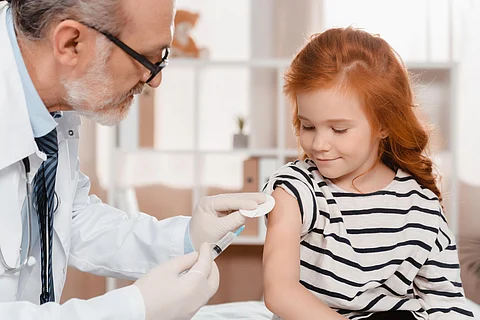Becoming a new parent brings plenty of challenges, and getting your young children all the vaccines they need, when they need them, can be daunting.
“Immunizations are a way for us to help people develop immunity so they can prevent infections,” explained Dr. Jonathan Miller, chief of primary care and pediatrics at Nemours Children’s Health in Wilmington, Del.
Yet, parents can sometimes feel overwhelmed trying to get all their children’s vaccines scheduled at the right time. To help, here's a timeline and dosing schedule for each vaccine from the U.S. Centers for Disease Control and Prevention, including the recommended ages for each dose.
Childhood immunization schedule
The Hepatitis B vaccine helps protect against the hepatitis B virus. It’s given in three doses:
First dose: birth
Second dose: 1-2 months
Third dose: 6-18 months
DTaP
This five-dose vaccine protects against three different bacterial infections: diphtheria, tetanus and pertussis (whooping cough):
Pneumococcal
Pneumococcal (PCV) vaccine helps keep your child safe from a bacterial infection called pneumococcal disease:
Tdap
The Tdap vaccine is administered for the same diseases as the DTaP vaccine but is recommended for older children aged 11-12 years, in one dose.
Rotavirus
This vaccine is given to protect against the rotavirus:
OR
Hib
Haemophilus influenzae type b (Hib) vaccinations guard against a type of bacteria that can cause a number of debilitating health conditions:
OR
ActHIB, Hiberix, Pentacel, or Vaxelis: first dose at 2 months, second dose at 4 months, third dose at 6 months and a booster at 12-15 months
IPV
Inactivated polio vaccine (IPV) vaccines protect against the life-threatening, paralyzing poliovirus:
First dose: 2 months
Second dose: 4 months
Third dose: 6-18 months
Fourth dose: 4-6 years
Starting at age 6 months, the influenza vaccine, which protects against different strains of the flu virus, is recommended annually:
One dose for children aged 6 months to 8 years who’ve had at least 2 influenza vaccine doses before July 1, 2022 (or 2 doses for children who have not)
One dose for children aged 9 or older
In July 2023, the U.S. Food and Drug Administration approved an antibody shot known as nirsevimab (Beyfortus) to guard against severe respiratory syncytial virus (RSV) in children. The next month, the CDC's Advisory Committee on Immunization Practices recommended the shot for the following age groups:
Babies aged 8 months or younger who were born during or are entering their first RSV season
Infants and children aged 8 to 19 months who are at increased risk of severe RSV disease entering their second RSV season
MMR
Measles, mumps and rubella are all caused by three different viruses, and the MMR vaccine protects against all of them:
First dose: 12-15 months
Second dose: 4-6 years
Varicella
Also known as the chickenpox vaccine, this protects against the varicella-zoster virus:
First dose: 12-15 months
Second dose: 4-6 years
Hepatitis A
The Hepatitis A vaccine protects against the hepatitis A virus. It’s given in two doses between the ages of 12-23 months, with a minimum of six months between doses.
Meningococcal
Meningococcal disease is caused by bacteria, and the vaccine helps prevent the most common form of the disease found in the United States:
First dose: 11-12 years
Second dose: 16 years
COVID-19
Miller explained how COVID mRNA vaccines are a little different from many other childhood shots.
"The mRNA teaches the cells in our body to create a protein that looks like the spike protein on [the] COVID [virus], and that allows us to then make antibodies against that spike protein," he said.
COVID-19 vaccine recommendations vary based on multiple factors, including age, if someone is immunocompromised or not, and if someone has had previous COVID-19 vaccines or boosters, among other factors. The CDC offers a breakdown of a vaccine schedule with these different factors for people 6 months and older.
Consult with your child’s healthcare provider to determine the most appropriate vaccine schedule for your family.
The CDC says that the human papillomavirus (HPV) is the most common sexually transmitted disease. Its namesake vaccine can defend against the diseases it causes, such as cervical cancer:
For children 9 to 14, two doses six to 12 months apart
For children ages 15 and older, three doses, with 1-2 months between the initial two doses and 6 months between the final two doses
Dengue
Dengue is caused by a virus that's spread by mosquitoes. Children ages 9-16 who have had dengue infection in the past and live in places where dengue is common need to be vaccinated. The vaccine is given in three doses, six months apart.
“Many of the…immunizations we give require more doses over time in order to make sure the immune system creates a lasting response to those infections,” Miller noted.
If you miss certain childhood vaccine doses, the CDC has a convenient catch-up immunization schedule you can follow.
References
Jonathan Miller, MD, chief, primary care and pediatrics, Nemours Children’s Health, Wilmington, Del.
U.S. Centers for Disease Control and Prevention: Child and Adolescent Immunization Schedule by Age
U.S. Centers for Disease Control and Prevention: Recommended Vaccinations for Infants and Children, Parent-Friendly Version
U.S. Centers for Disease Control and Prevention: Recommended Vaccinations for Children 7 to 18 Years Old, Parent-Friendly Version
U.S. Centers for Disease Control and Prevention: Meningococcal Vaccination
U.S. Centers for Disease Control and Prevention: Genital HPV Infection — Basic Fact Sheet
U.S. Centers for Disease Control and Prevention: Who Can Get a Dengue Vaccine & When
U.S. Centers for Disease Control and Prevention: Catch-Up Immunization Schedule for Children and Adolescents Who Start Late or Who Are More Than 1 Month Behind
Morbidity and Mortality Weekly Report: Use of Nirsevimab for the Prevention of Respiratory Syncytial Virus Disease Among Infants and Young Children: Recommendations of the Advisory Committee on Immunization Practices — United States, 2023



